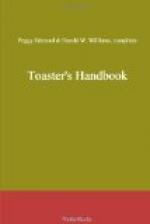“Dear Jane,—I
am sending you a postal order for 10s., which I
hope you may get—but
you may not—as this letter has to pass
the Censor.”
—Punch.
Two country darkies listened, awe-struck, while some planters discussed the tremendous range of the new German guns.
“Dar now,” exclaimed one negro, when his master had finished expatiating on the hideous havoc wrought by a forty-two-centimeter shell, “jes’ lak I bin tellin’ yo’ niggehs all de time! Don’ le’s have no guns lak dem roun’ heah! Why, us niggehs could start runnin’ erway, run all day, git almos’ home free, an’ den git kilt jus’ befo’ suppeh!”
“Dat’s de trufe,” assented his companion, “an’ lemme tell yo’ sumpin’ else, Bo. All dem guns needs is jus’ yo’ ad-dress, dat’s all; jes’ giv’ em de ad-dress an’ they’ll git yo’.”
See also War.
EVIDENCE
From a crowd of rah-rah college boys celebrating a crew victory, a policeman had managed to extract two prisoners.
“What is the charge against these young men?” asked the magistrate before whom they were arraigned.
“Disturbin’ the peace, yer honor,” said the policeman. “They were givin’ their college yells in the street an’ makin’ trouble generally.”
“What is your name?” the judge asked one of the prisoners.
“Ro-ro-robert Ro-ro-rollins,” stuttered the youth.
“I asked for your name, sir, not the evidence.”
Maud Muller, on a summer night,
Turned down the only parlor light.
The judge, beside her, whispered things
Of wedding bells and diamond rings.
He spoke his love in burning phrase,
And acted foolish forty ways.
When he had gone Maud gave a laugh
And then turned off the dictagraph.
—Milwaukee Sentinel.
One day a hostess asked a well known Parisian judge: “Your Honor, which do you prefer, Burgundy or Bordeaux?”
“Madame, that is a case in which I have so much pleasure in taking the evidence that I always postpone judgment,” was the wily jurist’s reply.
See also Courts; Witnesses.
EXAMINATIONS
An instructor in a church school where much attention was paid to sacred history, dwelt particularly on the phrase “And Enoch was not, for God took him.” So many times was this repeated in connection with the death of Enoch that he thought even the dullest pupil would answer correctly when asked in examination: State in the exact language of the Bible what is said of Enoch’s death.
But this was the answer he got:
“Enoch was not what God took him for.”
A member of the faculty of the University of Wisconsin tells of some amusing replies made by a pupil undergoing an examination in English. The candidate had been instructed to write out examples of the indicative, the subjunctive, the potential and the exclamatory moods. His efforts resulted as follows:




